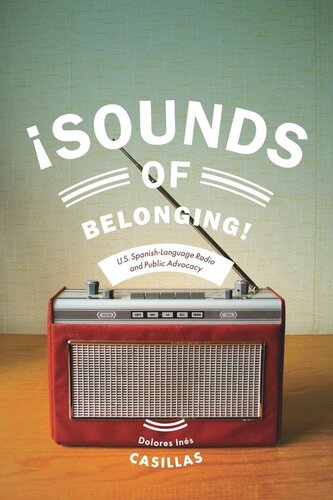

Most ebook files are in PDF format, so you can easily read them using various software such as Foxit Reader or directly on the Google Chrome browser.
Some ebook files are released by publishers in other formats such as .awz, .mobi, .epub, .fb2, etc. You may need to install specific software to read these formats on mobile/PC, such as Calibre.
Please read the tutorial at this link: https://ebookbell.com/faq
We offer FREE conversion to the popular formats you request; however, this may take some time. Therefore, right after payment, please email us, and we will try to provide the service as quickly as possible.
For some exceptional file formats or broken links (if any), please refrain from opening any disputes. Instead, email us first, and we will try to assist within a maximum of 6 hours.
EbookBell Team

4.4
12 reviewsHow Spanish-language radio has influenced American and Latino discourse on key current affairs issues such as citizenship and immigration.
Winner, Book of the Year presented by the American Association of Hispanics in Higher Education
Honorable Mention for the 2015 Latino Studies Best Book presented by the Latin American Studies Association
The
last two decades have produced continued Latino population growth, and marked
shifts in both communications and immigration policy. Since the 1990s, Spanish-
language radio has dethroned English-language radio stations in major cities
across the United States, taking over the number one spot in Los Angeles,
Houston, Miami, and New York City. Investigating the cultural and political
history of U.S. Spanish-language broadcasts throughout the twentieth century, Sounds
of Belonging reveals how these changes have helped Spanish-language radio
secure its dominance in the major U.S. radio markets.
Bringing together theories on the immigration experience with
sound and radio studies, Dolores Inés Casillas documents
how Latinos form listening relationships with Spanish-language radio
programming. Using a vast array of sources, from print culture and industry
journals to sound archives of radio programming, she reflects on institutional
growth, the evolution of programming genres, and reception by the radio
industry and listeners to map the trajectory of Spanish-language radio, from
its grassroots origins to the current corporate-sponsored business it has
become. Casillas focuses on Latinos’ use of Spanish-language radio to help
navigate their immigrant experiences with U.S. institutions, for example in
broadcasting discussions about immigration policies while providing anonymity
for a legally vulnerable listenership. Sounds of Belonging proposes that
debates of citizenship are not always formal personal appeals but a collective
experience heard loudly through broadcast radio.